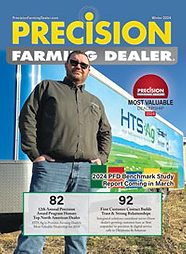Source: Bloomberg BusinessWeek
Louis Wischmeier oversees 5,300 acres of farmland near Columbus, Ind., and spends much of the winter trying to find the perfect “prescriptions,” as he puts it, for his fields. A large, soft-spoken man, Wischmeier pores over weather data, takes soil moisture readings, and studies the latest news on seed hybrids with the aim of maximizing crop yields. Over the past few years that meticulous planning has been undermined by unusual weather.
Heavy rains fell during the brief five-day planting windows, then scorching temperatures cracked seeds and suffocated crops. “Sometimes we have to replant two or three times to get a crop up and started,” Wischmeier says. He refuses to utter the words “global warming” or to complain, saying only that “the excessive weather events seem to have a huge impact on our success.”
To fight back, last year Wischmeier turned to a surprising place: Silicon Valley. He bought crop insurance from Climate Corp., a startup founded by two former Google executives and funded by $60 million in venture capital. Staffed by an army of data scientists, the company is bringing data analytics to rural America and helping farmers reap more consistent profits from their fields. It’s an example of how cloud computing, modeling, and other technologies that have reshaped the Web and business are now revolutionizing more traditional industries. “Software is going to fundamentally change how the world operates,” says David Friedberg, Climate’s chief executive officer and co-founder.
Historically, farmers have relied on crop insurance sold by the federal government. The program is rife with all the red tape bureaucracies are famous for. Farmers must plant their fields on a schedule determined by the government and consent to inspections. To estimate crop value, they have to record and turn over years’ worth of data about yields. When disaster hits, claims take months to process, and the payout often only covers costs, not lost profits.
Climate Corp. has a different approach. The 130-person company includes a dozen PhDs in fields including applied math, statistics, and neuroscience. They’ve harnessed decades’ worth of data from the National Weather Service and other sources to come up with a picture of rainfall, temperature, and soil conditions in farmland across America. The data sets are fine-tuned enough that Climate Corp. knows how the average weather at one spot differs from another 2½ miles down the road. It uses this information, along with historic crop yields, to predict how next year’s haul is going to look. “We’ve got a bunch of quants going over 30 years of daily weather data,” says Friedberg. “For each location, we have simulated the weather for the next 730 days, 10,000 times.” The data let the company customize insurance prices according to each farm’s risk factors and offer protection that supplements the federal offering, covering weather events including excessive rain and heat.
Climate Corp. approaches crop insurance with the typical Silicon Valley emphasis on speed and automation. Farmers log onto the startup’s site, input a few details about their planting plans, and an algorithm dubbed the Farm-Level Optimizer spits back policy options. Because its servers are always recording weather data, Climate Corp. knows when a policy is triggered by, say, a drought and automatically issues payments to the affected farmers. Climate Corp. also opens up its data trove to its customers, showing them the range of yields and profits they can expect based on likely weather conditions. Friedberg says thousands of farmers have insured millions of acres through the startup, though the company won’t divulge revenue details.
Friedberg studied astrophysics at the University of California at Berkeley before starting a career in finance in 2001, and he joined Google a few years later as an early member of its corporate development team. He got the idea for Climate Corp., originally called WeatherBill, after driving past a bike rental shop. “This guy rents bikes to tourists, and when it rains he just shuts down,” Friedberg says. “I started thinking about all the businesses affected by the weather, like ski resorts, festivals, and baseball games.” He co-founded Climate Corp. in 2006 and took a crack at insuring these types of businesses but ultimately found a more receptive audience among farmers.
Friedberg has hired dozens of recent graduates from agriculture-focused university programs to make sure the 10,000 agents selling federal insurance know about the Silicon Valley option. It’s not always easy persuading people accustomed to a formulaic government program to push a newfangled, data-driven product from Silicon Valley, even though they get a commission. Nor is it simple for them to persuade farmers to pay for additional insurance. But George Bercaw, an agent at Water Street Solutions, has taken a Climate Corp. training course and says the high-tech approach fits well with what the farming industry calls the Age of Precision Agriculture. “We work with progressive growers, and I need something to bring to the table,” he says.
Wischmeier likes the added peace of mind Climate Corp.’s insurance provides. Every year he spends millions of dollars during the planting season, including an annual purchase of three massive John Deere tractors equipped with $15,000 computing systems. (Wischmeier sells the old ones because he likes to have the latest technology to minimize the chance of a breakdown during the short planting window, when farmers work around the clock.) If excessive rains damage his crops in May, Climate Corp. will pay him quickly enough to buy more seed and replant; the federal insurance doesn’t pay out until after the season.
The government also bases its payments on yield averages established over many years, so it tends to trail advances in farming technology that boost yields and doesn’t cover so-called specialty crops such as avocados and blueberries. With Climate Corp., there’s no such disincentive. “This gives us a huge chance to feel comfortable targeting high-profit, specialty crops,” Wischmeier says.
Agriculture isn’t the only industry that stands to gain. Friedberg says Climate Corp. shows what Silicon Valley can do when it steps away from its maniacal focus on building social networks and advertising companies. “Doing yet another app just because everyone seems to be into it is not the right reason,” Friedberg says.






Post a comment
Report Abusive Comment